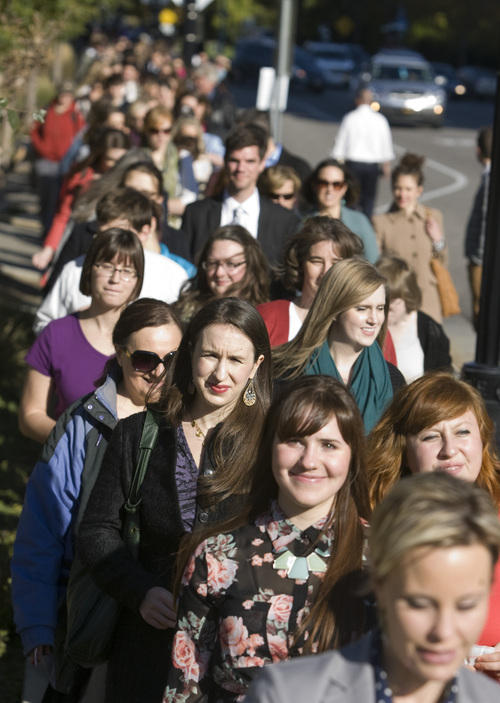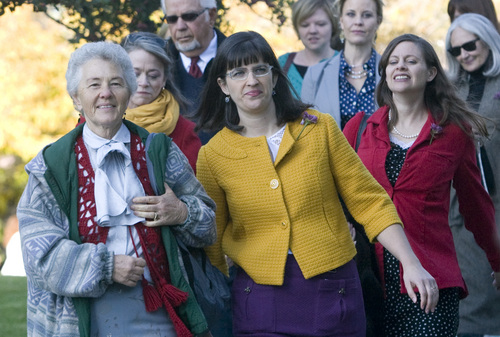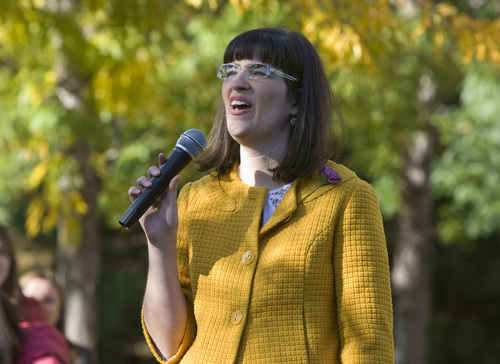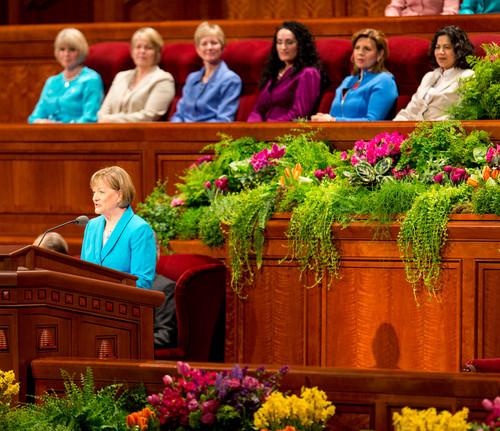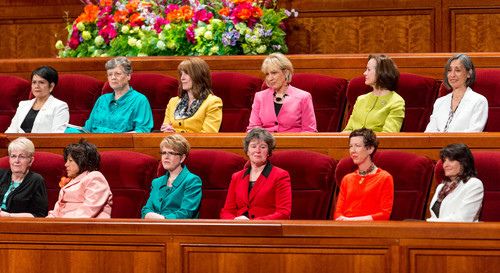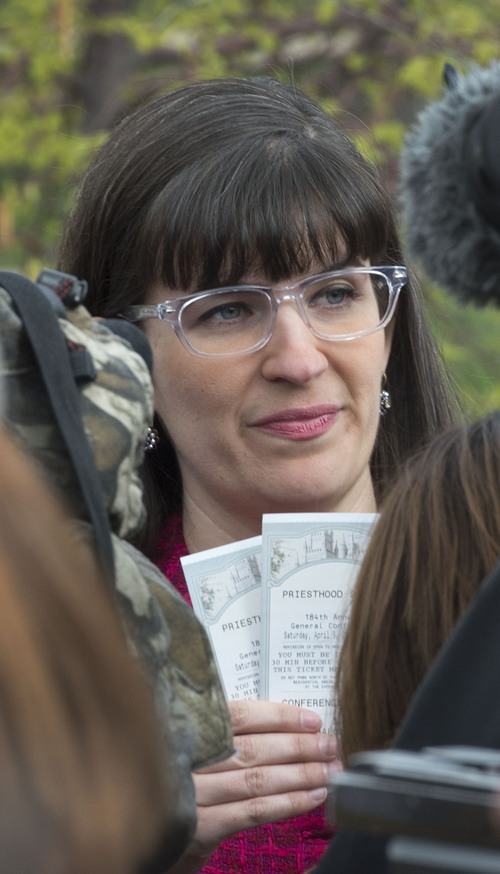This is an archived article that was published on sltrib.com in 2014, and information in the article may be outdated. It is provided only for personal research purposes and may not be reprinted.
At one end, you have Mormon women calling for female admission into the all-male priesthood.
At the other, you have LDS women reticent of any changes to their place in the faith.
But what about the masses — perhaps millions — in the middle?
These moderates may not desire priesthood status (polls show most LDS women don't), but they're hardly satisfied with the status quo. They don't want to sit in the bishop's chair on Sunday, but they would like to see more women on the stand at services.
Some see themselves as feminists; some don't. Some support Ordain Women; some oppose it. Some cry out for change; some quietly pray for it.
Either way, the conversation about the role of women in The Church of Jesus Christ of Latter-day Saints has migrated from the back benches to the front pulpit, from obscure blogs to international headlines.
Here, then, are the thoughts of 10 LDS women on the latest controversies surrounding Ordain Women, the disciplinary action pending against its founder, and the group's impact on the current gender debate in their Mormon wards and the Mormon world.
The LDS Church claims Ordain Women (OW) has disrupted and stunted the conversation about women in Mormonism. Do you agree?
Suzette Smith, a blogger at Exponent and an OW leader •Before the church made this statement, I was unaware that there were any conversations. If the church is having conversations about women, they are doing it quietly. Because of that, it's hard to tell if OW is being disruptive or not. I can't see how OW could disrupt talks since we are very interested in promoting and discussing women within the LDS faith.
Shelah Miner, managing editor of Segullah, a Mormon literary journal • I used to talk about gender inequality in the church with a few very close, like-minded friends, and, when I was feeling very brave, with people in the bloggernacle. One thing Ordain Women has done is to shift the discussion from these quiet, whispered discussions to something that people discuss out in the open, not just among the small number of people who write and read Mormon blogs. It's also opened the eyes of some people to the fact that there is inequality in our administrative structure. When you live with something your entire life, it's hard to see the inequalities unless they're pointed out.
Hannah Wheelwright, creator of the Young Mormon Feminists blog and an OW leader •I wholeheartedly disagree with this claim. I think the conversation that the church was having previously was a narrow and chilled environment in which any open discussion of questions or difficulties had to be couched in apologetic and painfully cautious terms; the conversation has been expanded by Ordain Women and is more direct, honest and filled with passion for the potential of our church.
Aimee Hickman, co-editor of Exponent II, a Mormon women's publication •OW's success at bringing the topic of women's ordination into wider discourse was simultaneously premature and long overdue. As a church whose history and current temple practices inspire contemplation about women's relationship to the priesthood, it's surprising to me that this is the first time we've seen this discussion prominently featured within mainstream Mormonism in my lifetime. At the same time, I think the last year has shown how premature this discussion might be to many members and church leaders who are not only comfortable with, but also committed to a model of ecclesiastical and eternal leadership which is exclusively male. I think we have a long way to go in increasing women's visibility and seeking further revelation on gender roles in the temple and in the eternities before the subject of women's ordination can move forward in any meaningful way. While I think that some of OW's actions and leadership may have halted that progress in the short term, I think it would be a mistake to underestimate how the conversation they initiated will continue to influence a rising generation of women and men.
Genevieve Oliver,graduate student in religious studies at Indiana University •Whatever one thinks of Ordain Women's position and tactics, there's no question they have stimulated a great deal of public conversation, and they've shifted the conversational center significantly toward female ordination and toward feminist positions more generally. Not that long ago openly advocating for ordination was a radical, outlying position, and now I hear more and more known moderate voices acknowledging injustices in the current structure and acknowledging that ordination would have many benefits.
Andrea Radke-Moss, a history professor at BYU-Idaho and a blogger for Juvenile Instructor •At first, I felt incredibly discouraged that the action against [OW founder] Kate Kelly would end or silence all discussion on changes and progress for women in the church. But, in the last week, I have had some interesting and open conversations with people that have surprised me — people like family members, students, colleagues and male leaders — all of which have actually made me think that more and more people are considering and reconsidering all aspects of theological and historical implications of the roles of women in the church. Many people are not convinced of the ordination of women, but are at least looking more carefully at ways that women's roles might be expanded.
Cynthia Lee, a blogger from Palo Alto, Calif., for By Common Consent •I have not been a member or supporter of Ordain Women, but I value their contribution to the diversity of voices within the church and the conversations around women's participation in the church. Zion flourishes when each member is anxiously engaged in contributing their unique talents, including their thoughts and opinions. I do not share the desire for ordination, but, precisely because of that difference, I value the addition Kate Kelly and Ordain Women provide to the conversation. I do not believe they have inhibited productive conversation. On the contrary, they have opened up space for a broader range of faithful expressions of feminist inquiry and discussion in the church. As a moderate and faithful feminist, I have felt an increase in the ability to be received as moderate and faithful when presenting my thoughts after the arrival of Ordain Women.
Rosalynde Welch, a St. Louis writer •In the short term, I think OW will chill some of the momentum we've seen on gender issues in the church over the past few years. I think church leaders rightly understand that seismic shifts in church practices cannot come from direct political pressure without deeply dividing the membership and diminishing the moral authority of revelation itself. The schism in the church following the 1890 revelation ending polygamy, after intense outside pressure, taught us that. But even if the short-term effect is chilling, I think that future generations will look back to see that OW prompted us to think closely about necessary questions. What would it mean to ordain women and girls into the Aaronic and Melchizedek priesthoods? That is not the only way to integrate women into priestly and administrative roles in the church, but it's certainly one option, and OW has done the hard work of making us think it through carefully as a community, setting the stage in our own hearts for future revelation.
Rachel Whipple, a blogger for Times and Seasons • OW has put all women's issues in the church under a spotlight. A conversation has been going on for years about the gender inequalities of the church, from modesty standards and chastity lessons to the church's affiliation with Boy Scouts of America to the disproportionate representation of men in ward and stake councils and the general leadership of the church. ... OW, by asking for both the simplest and greatest change possible, has both expanded the conversation about the role and treatment of women in the church and polarized it.
Do you think the church's action will push more moderates toward OW or away from it?
Neylan McBaine, founder of the Mormon Women Project • The situation with Kate has resulted in an unfortunate polarization. Yes, some women are moving closer to OW out of solidarity for the right to ask questions, but others have taken the situation as a mandate to shut down conversation. I felt that, before last week, there was a tenuous alliance where Mormons across the spectrum at least tacitly understood that women's inclusion at church was at least an acceptable and important focus for both local leaders and general leaders. ... I think that alliance has now dissolved at least temporarily because many people will not be able to distinguish Ordain Women's tactics from their participation in the larger conversation. As a result, I fear that those who were not comfortable with the conversation in the first place will abandon it altogether, even though I am convinced it was not the discussion on women that has resulted in Kelly's discipline but rather her series of deliberate choices that positioned her at odds with both her local and general leadership.
Suzette Smith •Both. There are some moderates who find safety in black-and-white thinking and like strong decisions. I think the church's actions are seen as protective and some people feel comfortable with that. Other moderates are shocked by the seemingly hard lines drawn by the church and will feel conflicted. I think some will come toward OW and others will draw back from it.
Shelah Miner •I consider myself a fairly moderate, mainstream member of the church. I'm not a member of Ordain Women. And while I recognize and feel troubled by some of the gender inequities in the church, I'm not sure I would ever have considered joining the movement for myself. But I did go through a time when I thought seriously about joining for my three daughters. My oldest daughter is 12, and she has started to recognize some of the inequalities and ask questions about them. I feel like my answers are unsatisfactory, both to her and to myself, and I want my girls to know that I'm willing to be an advocate on their behalf. But now, I'd be afraid to join. While there may be some people who will feel compelled to join OW from this experience, I think that most of the women I talk to are less likely to join (even as they express support for Kate Kelly), and more likely to modulate themselves when they're not sure how their views will be received.
Hannah Wheelwright •I think the church's actions will push Mormon feminists away but will simultaneously embolden moderate members to speak up about their sympathies with OW. So many moderate members have not joined OW but defended us to other members. I think the church has lit a fire under moderates to push a conversation they didn't intend to about discipline and doctrine.
Genevieve Oliver •It's impossible to know whether the church's actions will push more feminists toward Ordain Women or away from it. I'm sure motion is occurring in both directions. One of many painful ironies in the situation is that if feminists are indeed being polarized by the church's actions, as seems likely, the church may be diminishing the ranks of those they clearly most hope to engage.
Cynthia Lee •Among moderates, the church's action has increased empathy for Kate Kelly as a person and fellow saint, but not necessarily increased support for the specific aims of Ordain Women. It does seem to have hardened and sharpened the feelings of those already opposed to Ordain Women, which is unfortunate for the hurt and divisions that will cause.
Rosalynde Welch •I think many moderates are poised in great tension between their loyalty to the church and their sympathy for the concerns of OW. Any gesture of peacemaking or reconciliation on either side would, I think, be welcomed with relief and good will. I hope with all my heart that some peaceful third way materializes, allowing all parties to retain their dignity while offering humility and love to the other side.
Rachel Whipple •Many conservative Mormons are bewildered by OW's request and appalled by their actions. Moderate Mormons who sympathize with the request for ordination, even if they personally wouldn't go quite that far, have been reluctant to give OW full support because it all feels too confrontational. The recent disciplinary action reminds us all of the potential cost of perceived dissent. While some moderates will be emboldened enough to throw themselves on the sacrificial altar to advance the cause, most will be more circumspect in order to avoid the appearance of being "divisive or suggestive of apostasy."
What's your experience at the ward level?
Suzette Smith •My ward has been open and loving and generous toward me — whether they agree with OW or not. They have cared for me in meaningful ways. And we have served together without conflict. Many of my ward members have engaged me in honest, open discussions about OW — and I think we have both learned from our varying points of view.
Shelah Miner •My experience with the leaders in my ward has been universally positive. But a few weeks ago, I was asked to give a Relief Society lesson on "The Keys and Authority of the Priesthood" by [apostle] Dallin H. Oaks. It was a hard lesson for me to prepare, because I felt like I had to balance the intent of the speaker and the receptiveness of my audience with my own personal feelings about the source material. When I announced the topic, an elderly woman on the front row raised her hand and said something along the lines of, "I've always been happy with my role in the church, unlike those women who raise a ruckus and want to overstep and take the priesthood from the men." It's been my experience that people feel a lot more comfortable being loud and confident in expressing conservative viewpoints in Sunday School and Relief Society than they do expressing more liberal viewpoints. It makes me wonder how many other women there are who think and feel more like I do and spend their Sundays biting their tongues.
Hannah Wheelwright •My last two wards have been wonderful, and just two weeks ago in our Relief Society lesson on the priesthood, we had a refreshingly direct discussion of how women have used the priesthood in their callings. I believe there is immense change happening in wards across the world, and much of it can be attributed to Ordain Women's emphasis on authenticity by faithful Mormon feminists.
Cynthia Lee •In the past week, I have had conversations with several of my ward members who have widely varying opinions on Ordain Women and the discipline actions. Where there has been agreement is that we should do much more to ensure that women have a leadership voice in the church and to ensure that any cultural biases against women are reformed. We should examine every area of gender difference in the church — from financial clerks to seminary teachers, from youth budgets to General Conference speakers — and determine if there is a doctrinal warrant for it. If not, we should move swiftly to end that gender difference. This would have an immediate and dramatic impact, without doctrinal change or ordination. Leadership listening to women is a well-intentioned but inadequate model for inclusion of women's input. Instead, leadership at all levels needs to include women, through councils where women's voices are on equal footing.
Rachel Whipple •I have been candid about expressing both my faith and my (hopefully constructive) criticism in the branch and wards where I have lived. And as much as I have been careful to frame my concerns in a faith-promoting narrative of seeking to know and understand God's will for me, my comments have been well received. I make a deliberate effort to not sow seeds of doubt. I don't want to be responsible for precipitating another's faith crisis, but I have made myself known as one with whom others can discuss their struggles. —
Kelly's Sunday hearing
O Kate Kelly's disciplinary council is scheduled for Sunday at 7 p.m. with her bishop in Virginia. The Ordain Women founder, who now lives in Utah, won't be there. She instead plans to attend a vigil at the LDS Church Office Building in Salt Lake City.


